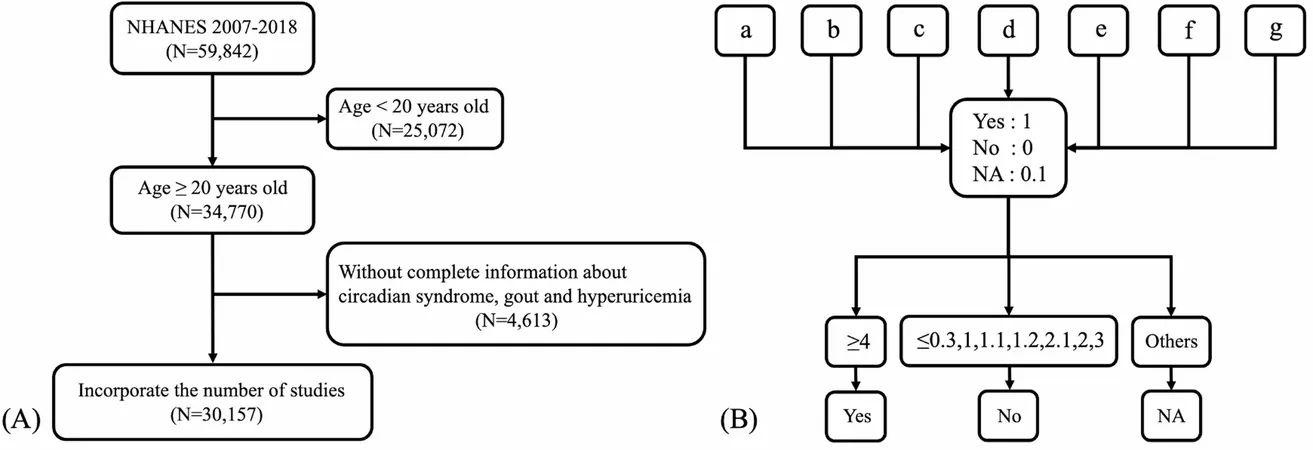
Revolutionary Link Uncovered: Circadian Syndrome's Impact on Gout and Hyperuricemia
2025-06-10
Author: Ming
New Insights from the NHANES Study
Recent findings from a comprehensive analysis of data gathered through the National Health and Nutrition Examination Survey (NHANES) are shedding new light on the associations between Circadian Syndrome (CircS), gout, and hyperuricemia. Spanning from 2007 to 2018 and encompassing over 59,000 participants, this study provides a robust examination of how these conditions intertwine.
What is Circadian Syndrome?
Circadian Syndrome is characterized by a range of symptoms, including metabolic disturbances, sleep disruptions, and cardiovascular issues. Defined by criteria such as waist circumference, triglyceride levels, blood pressure, and shortened sleep duration, CircS may lead to a host of health complications if left unchecked.
Key Findings from the Analysis
The analysis revealed a staggering correlation: individuals with CircS demonstrated significantly higher risks for both gout and hyperuricemia compared to those without the syndrome. Notably, those with a CircS score of 4 or higher presented with higher uric acid levels, confirming that circadian rhythm disruptions significantly elevate gout risks. With a weighted mean age of participants at 47.44 years, the data suggested that older adults are particularly susceptible.
The Complex Relationship Between CircS, Gout, and Hyperuricemia
Diving deeper into the numbers revealed that factors such as obesity, smoking status, and chronic conditions like diabetes and cardiovascular disease are interlinked with the prevalence of CircS. When analyzed through logistic regression, the risk for both gout and hyperuricemia escalated alarmingly among CircS individuals.
Biological Insights into Circadian Disruption
The biological clock in our brains, specifically the suprachiasmatic nucleus, regulates bodily functions tied to metabolism, immune response, and overall health. Disruptions to this system can trigger inflammatory responses, potentially leading to increased susceptibility to conditions like gout.
Implications for Disease Prevention and Health Strategies
The findings call for a reevaluation of our approaches to managing health conditions related to metabolic syndrome. Emphasizing the importance of restoring a healthy circadian rhythm could serve as a pivotal strategy to not only control weight and improve metabolic health but also mitigate the risks associated with conditions such as gout and hyperuricemia.
Final Thoughts: A Call to Action
As we deepen our understanding of Circadian Syndrome and its implications within the broader context of public health, the urgency to prioritize sleep hygiene and regulate circadian rhythms becomes clear. Addressing these factors could lead to innovative treatments and preventive strategies that resonate profoundly within our communities. Further research is crucial in unraveling the complexities of how these syndromes affect our health and how we might combat them effectively.


 Brasil (PT)
Brasil (PT)
 Canada (EN)
Canada (EN)
 Chile (ES)
Chile (ES)
 Česko (CS)
Česko (CS)
 대한민국 (KO)
대한민국 (KO)
 España (ES)
España (ES)
 France (FR)
France (FR)
 Hong Kong (EN)
Hong Kong (EN)
 Italia (IT)
Italia (IT)
 日本 (JA)
日本 (JA)
 Magyarország (HU)
Magyarország (HU)
 Norge (NO)
Norge (NO)
 Polska (PL)
Polska (PL)
 Schweiz (DE)
Schweiz (DE)
 Singapore (EN)
Singapore (EN)
 Sverige (SV)
Sverige (SV)
 Suomi (FI)
Suomi (FI)
 Türkiye (TR)
Türkiye (TR)
 الإمارات العربية المتحدة (AR)
الإمارات العربية المتحدة (AR)